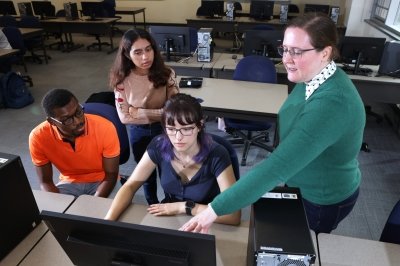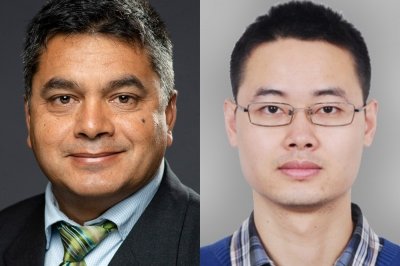New faces, new roles, new funding. Browse our news briefs to learn more about the additions, advancements, and improvements that impacted the College of Computing in the 2021-22 academic year.
New Computer Science Faculty: Fall 2022
The Department of Computer Science welcomed three new faculty members this fall. Andy Duan is the new chair and professor of the department. He comes to Michigan Tech from the University of Missouri at Columbia, where he was an associate professor of electrical engineering and computer science.

Serein Al-Ratrout, a teaching assistant professor, was an adjunct assistant professor in the College’s computer science department in the 2021-22 academic year. She has a PhD in software engineering from De Montfort University, UK.
Wenbin Zhang, assistant professor, comes to the College of Computing from Carnegie Mellon University. He earned his PhD in Information Systems at the University of Maryland, Baltimore County. His research interests include societal aspects of AI, health informatics, representation learning, data stream mining, and machine learning for science and interdisciplines.
New Computer Science Faculty: Fall 2021
The Department of Computer Science welcomed two faculty members in fall 2021. Dukka KC, an associate professor, came to Michigan Tech from Wichita State University.
Dukka was appointed associate dean of research for the College in October 2021, and associate director of the Institute of Computing and Cybersystems in February 2022. His expertise is in applied deep learning and bioinformatics.
Xinyu Lei, assistant professor, joined Michigan Tech directly following completion of his PhD at Michigan State University. Lei’s cybersecurity research is applied to help users protect their private information while using Internet of Things devices.
Brian Yuan Receives ORAU Award
Xiaoyong (Brian) Yuan, assistant professor in the Departments of Applied Computing and Computer Science, has received the 2022 ORAU Ralph E. Powe Junior Faculty Enhancement Award in Mathematics/Computer Sciences.

Awarded by the Oak Ridge Associated Universities (ORAU) Council of Sponsoring Institutions, Yuan was selected from 155 applications at 87 ORAU member institutions. The award represents public recognition by academic peers of the quality and promise of Yuan’s research. He will receive a one-year grant of $5,000 from ORAU and a matching award from Michigan Tech. The award funds can be used for expenses relevant to Yuan’s research.
Yuan’s areas of research include machine learning, security and privacy, and cloud computing.
Laura Brown Is Director of Data Science Initiatives
Laura Brown, associate professor of computer science, was appointed director of data science initiatives in October 2021. The new College leadership position reinforces the growing importance of data science in both the College’s strategic growth priorities and the industries the College serves.

Brown will guide the College’s focus on growing enrollment in the MS in Data Science, work to identify new data science degree opportunities, and assist in developing broad research teams across the University.
“Laura has provided exemplary leadership in data science to the College and University for years. This new role formalizes her role, while also setting our expectations even higher,” says Dean Dennis Livesay. “Growing data science at Michigan Tech is one of our biggest priorities.”
This fall, enrollment in all College of Computing graduate programs jumped 60.5 percent with total graduate enrollment of 183 students. The MS in Data Science grew by 87.5 percent.
Leo Ureel Is PI of $599K NSF R&D Grant
Leo Ureel, assistant professor of computer science, is the principal investigator of a $599,732 research and development grant from the National Science Foundation.

The project, “Rich, Immediate Critique of Antipatterns (RICA) in Novice Programmer Code: Broadening Adoption, Supporting Student Learning, and Enhancing Programming Competencies,” aims to develop a system that will automatically detect coding mistakes and provide immediate, high-quality feedback to students in introductory programming classes.
“Providing feedback in a timely manner using human graders is often difficult due to rapidly increasing class sizes and instructor shortages,” says Ureel. “Immediate feedback to students significantly improves learning outcomes and results.”
Tim Havens Is Director of Great Lakes Research Center
In January 2022, Tim Havens was appointed director of the Great Lakes Research Center (GLRC), in addition to continuing his roles as director of the Institute of Computing and Cybersystems and the William and Gloria Jackson Professor in Computer Science.

“The GLRC is striving to become the premier research institution on campus, both in terms of research excellence and in the support that GLRC staff bring to campus researchers,” said Havens. “GLRC faculty and staff and their diverse research are at the top of their fields. The Center will not only continue to push the envelope about what can be learned about Great Lakes and coastal oceans systems, but also look for opportunities in the uncharted waters of complex, real-world problems that require multiple-disciplinary approaches to resolve.”
$4.3M Funding for Genomic Surveillance
Michigan Tech has received $4.3 million as part of an $18.5 million, two-year federal grant to collect and analyze genomic data to address emerging infectious disease threats and enhance the state’s ability to respond to those threats. The funding will increase sequencing capacity in the state, starting with SARS-CoV-2.
Dukka KC, associate professor of computer science, is a co-PI on the project. Dukka will develop a robust computational infrastructure and a bioinformatics workflow/pipeline for genomic surveillance. The scalable computational infrastructure will build bioinformatics capabilities in Michigan, improve timely genomic surveillance of infectious disease threats, and alert the public of detrimental SARS-CoV-2 variants in Michigan.
Guy Hembroff, associate professor of health informatics in the applied computing department, is senior personnel on the project. Hembroff has expertise in developing and managing AI prediction models for large-scale medical data and images. He’ll establish an outbreak surveillance infrastructure model for the public health disease population in the western Upper Peninsula and facilitate a partnership among Michigan Tech, healthcare providers, and federal and state agencies to transport and report environmental, human, and animal information and samples in the region.
Soner Onder Awarded $1.2M
Soner Onder, professor of computer science, was awarded a $1.2M collaborative medium grant from the National Science Foundation (NSF) titled, “Collaborative Research: SHF: Medium: Vectorized Instruction Space (VIS).”
A joint project with Florida State University, each university receives an equal share of $600,000. Michigan Tech is the lead institution. The project targets a long-unsolved problem in the handling of computer programs: the efficient processing of control-flow instructions. It aims to significantly increase the performance of application programs ranging from those running on mobile devices to those utilized by ever-growing data centers.
Onder has four active NSF grant awards; the combined MTU share is over $1.6 million.
Brian Yuan Awarded $900K NSF Grant
Brian Yuan, assistant professor of computer science and applied computing, is the principal investigator (PI) of a $500,000 National Science Foundation (NSF) grant, “CNS Core: Small: Privacy-Preserving On- Device Intelligence in the IoT Era.”

Lan Zhang (electrical and computer engineering department) is co-PI. The project intends to develop privacy-preserving on-device intelligence for the Internet of Things era.
Yuan is also PI of an new $409,000 NSF grant project, “Collaborative Research: SHF: Small: Artificial Intelligence of Things (AIoT): Theory, Architecture, and Algorithms.” The research is a collaboration is between Michigan Tech and the University of Florida
Michigan Technological University is an R1 public research university founded in 1885 in Houghton, and is home to nearly 7,500 students from more than 60 countries around the world. Consistently ranked among the best universities in the country for return on investment, Michigan's flagship technological university offers more than 120 undergraduate and graduate degree programs in science and technology, engineering, computing, forestry, business, health professions, humanities, mathematics, social sciences, and the arts. The rural campus is situated just miles from Lake Superior in Michigan's Upper Peninsula, offering year-round opportunities for outdoor adventure.







